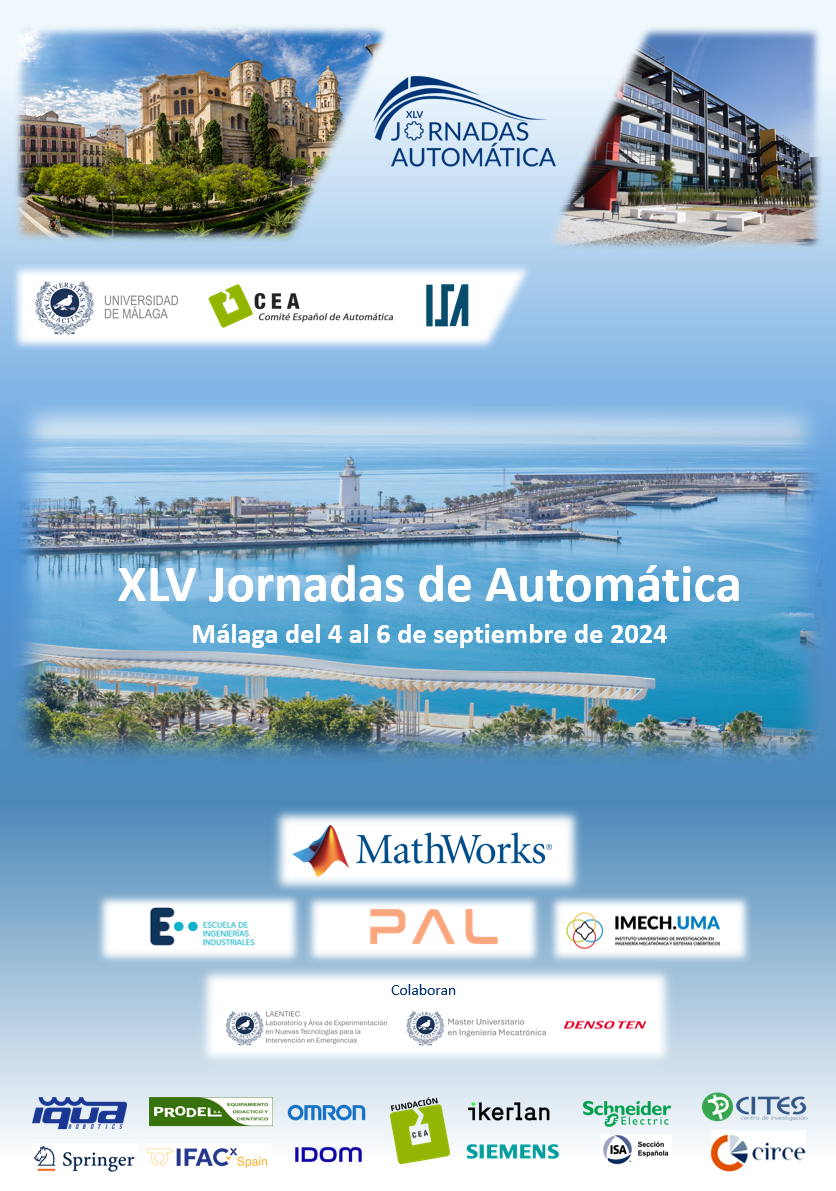Soluciones innovadoras de energía marina
Combinando columnas de agua oscilante y turbinas eólicas flotantes para una mayor eficiencia
DOI:
https://doi.org/10.17979/ja-cea.2024.45.10932Palabras clave:
Energía offshore, Turbinas eólicas flotantes, Columnas de agua oscilante, Energía renovable, Estabilidad hidrodinámicaResumen
Este artículo investiga la incorporación de Columnas de Agua Oscilante (OWCs) en Turbinas Eólicas Flotantes (FWTs) semisumergibles para mejorar la extracción de energía en alta mar. El objetivo de combinar OWCs con FWTs es reducir los movimientos oscilatorios causados por las olas y el viento, mejorando así la eficiencia del sistema y extendiendo su vida operativa. El estudio implica el rediseño de la plataforma FWT existente, conocida como WINDMOOR, para integrar OWCs en dos de sus tres columnas, específicamente para un sistema de FWT de 12 MW. El proceso de rediseño prioriza la estabilidad hidrostática y el rendimiento hidrodinámico para soportar los elementos adicionales de OWC. Se realizan análisis hidrodinámicos para evaluar el rendimiento de la plataforma híbrida en comparación con el diseño original, centrándose en la reducción de los movimientos oscilatorios. Los resultados destacan los beneficios potenciales de integrar OWCs en los sistemas FWT, particularmente en términos de mejorar la eficiencia de generación de energía y la resistencia estructural.
Referencias
Aboutalebi, P., Garrido, A. J., Garrido, I., Nguyen, D. T., Gao, Z., 2024. Hydrostatic stability and hydrodynamics of a floating wind turbine platform integrated with oscillating water columns: A design study. Renewable Energy 221, 119824.
Aboutalebi, P., M’zoughi, F., Garrido, I., Garrido, A. J., 2021a. Performance analysis on the use of oscillating water column in barge-based floating offshore wind turbines. Mathematics 9 (5), 475.
Aboutalebi, P., M’zoughi, F., Garrido, I., Garrido, A. J., 2023. A control technique for hybrid floating offshore wind turbines using oscillating water columns for generated power fluctuation reduction. Journal of Computational Design and Engineering 10 (1), 250–265.
Aboutalebi, P., M’zoughi, F., Martija, I., Garrido, I., Garrido, A. J., 2021b. Switching control strategy for oscillating water columns based on response amplitude operators for floating offshore wind turbines stabilization. Applied Sciences 11 (11), 5249.
Ahmad, I., M’zoughi, F., Aboutalebi, P., Garrido, I., Garrido, A. J., 2023a. Fuzzy logic control of an artificial neural network-based floating offshore wind turbine model integrated with four oscillating water columns. Ocean Engineering 269, 113578.
Ahmad, I., M’zoughi, F., Aboutalebi, P., Garrido, I., Garrido, A. J., 2023b. A regressive machine-learning approach to the non-linear complex fast model for hybrid floating offshore wind turbines with integrated oscillating water columns. Scientific Reports 13 (1), 1499.
DNV, G., 2017. Sesam user manual-wadam. DNV GL Software.
Kamarlouei, M., Gaspar, J., Calvario, M., Hallak, T., Mendes, M. J., Thiebaut, F., Soares, C. G., 2020. Experimental analysis of wave energy converters concentrically attached on a floating offshore platform. Renewable Energy 152, 1171–1185.
MANUAL, S. U., 2017. Wave analysis by diffraction and morison theory.
Mello, P. C., Malta, E. B., da Silva, R. O., Candido, M. H., do Carmo, L. H. S., Alberto, I. F., Franzini, G. R., Simos, A. N., Suzuki, H., Gonc ̧alves, R. T., 2021. Influence of heave plates on the dynamics of a floating offshore wind turbine in waves. Journal of Marine Science and Technology 26, 190–200.
M’zoughi, F., Aboutalebi, P., Garrido, I., Garrido, A. J., De La Sen, M., 2021. Complementary airflow control of oscillating water columns for floating offshore wind turbine stabilization. Mathematics 9 (12), 1364.
M’zoughi, F., Garrido, I., Garrido, A. J., De La Sen, M., et al., 2023. Fuzzy airflow-based active structural control of integrated oscillating water columns for the enhancement of floating offshore wind turbine stabilization. International Journal of Energy Research.
Sarmiento, J., Iturrioz, A., Ayllón, V., Guanche, R., Losada, I., 2019. Experimental modelling of a multi-use floating platform for wave and wind energy harvesting. Ocean Engineering 173, 761–773.
Sierra-García, J., Santos, M., 2021. Redes neuronales y aprendizaje por refuerzo en el control de turbinas eólicas. Revista Iberoamericana de Automática e Informática industrial 18 (4), 327–335.
Slocum, A., Kluger, J., Mannai, S., 2019. Energy harvesting and storage system stabilized offshore wind turbines. In: 2019 Offshore Energy and Storage Summit (OSES). IEEE, pp. 1–6.
Zhang, Y., Zhao, X., Wei, X., 2020. Robust structural control of an underactuated floating wind turbine. Wind Energy 23 (12), 2166–2185.
Descargas
Publicado
Número
Sección
Licencia
Derechos de autor 2024 Payam Aboutalebi, Fares M'zoughi, Irfan Ahmad, Tahereh Bagheri Rouch, Izaskun Garrido, Aitor J. Garrido

Esta obra está bajo una licencia internacional Creative Commons Atribución-NoComercial-CompartirIgual 4.0.





